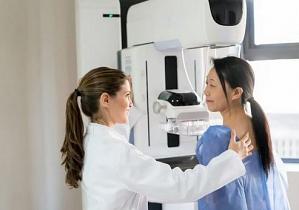7 steps to prevent cancer in women and what annual screenings could save your life
Cancer is a scary topic. Often, we'd rather not think about it, and sometimes that means putting off important, potentially life-saving yearly cancer screenings like mammograms and pap smears.
According to a press release from the CDC in 2015, 1 in 5 women were not up to date with their cervical cancer screenings and 1 in 4 were not up to date on their annual breast exams.
However, there are shifting perspectives on how often you should be screened for cancer, says Kathryn Rexrode, MD, chief of the division of women's health at Brigham and Women's Hospital.
Here's what annual cancer screenings two doctors who specialize in preventive medicine recommended for women aged 21-50 , and what else to do to drastically lower the risk of cancer.
How to reduce your risk of cancer
The best way to reduce your risk of developing cancer is to create healthy, lifelong habits. Getting annual cancer screenings shouldn't replace taking preventive steps to maintain your health.
"Screening isn't always enough, it's not preventing cancer. Screening is finding an early cancer so we can treat it, rather than preventing it, which is what the behavioral factors would be," says Rexrode.
Additionally, there are many cancers like pancreatic cancer and ovarian cancer that are difficult to catch with screenings.
1. Avoid alcohol
Alcohol significantly elevates the risk of developing breast cancer, among others, says Rexrode.
"It tends to not be a message people love to hear, but in terms of the major factors that have been shown to modify your long-term cancer risk, alcohol is pretty much up there," Rexrode says.
2. Don't smoke, or if you do, stop
Tobacco increases your risk of cancer significantly. A frequent smoker increases their likelihood of developing lung cancer by 15% 30% according to the CDC. Even smoking socially can increase your risk of developing other cancers like uterine cervix cancer, and esophageal cancer.
Smoking and chewing tobacco should be avoided entirely. Even if you have a history of smoking, quitting will still reduce your risk of developing cancer by 40% according to John Hopkins Medicine.
3. Get the HPV vaccine and practice safe sex
Contracting HPV is a risk factor for developing cervical cancer, among others. The Gardasil vaccine protects against the cancer causing strains of HPV.
Most people receive the vaccine between the ages of 11 and 12, however, it is recommended for adults up to the age of 26. Talk to your doctor about receiving the vaccine if you're between the ages of 27 and 45.
4. Eat a balanced diet
Obesity and a poor diet are also risk factors for cancer. One in five cancer cases are related to having a poor diet, being overweight, and not exercising. However, eating a mainly plant-focused diet reduces your risk of developing cancer, says Therese Bevers, a women's cancer specialist at MD Anderson Cancer Institute.




